Maintaining the Renewable Fuel Standard (RFS) may be more important to corn growers than a new farm bill.
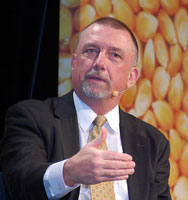 “If you took a poll of our members, and we may well do that at our Commodity Classic next week, I would say that they view the RFS as more important than the farm bill,” said National Corn Growers Association (NCGA) Vice President of Public Policy Jon Doggett during last week’s National Ethanol Conference.
“If you took a poll of our members, and we may well do that at our Commodity Classic next week, I would say that they view the RFS as more important than the farm bill,” said National Corn Growers Association (NCGA) Vice President of Public Policy Jon Doggett during last week’s National Ethanol Conference.
Doggett says it is interesting that even other crop producers besides corn consider the RFS to be very important. “We’ve got to work together on these things, we’ve got to quit trying to figure out who’s the winner and who’s the loser because once we devolve into that kind of discussion, we all lose.”
Listen to or download Doggett’s comments here: Jon Doggett at NEC
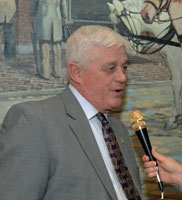 Corn growers are now gathering this week in Nashville for the Commodity Classic, and NCGA president Garry Niemeyer of Illinois says there is a lot of truth in the idea that the RFS is more important to them than the farm bill. “The Renewable Fuel Standard is really what sets the basis for where we are with ethanol,” said Niemeyer. “We’ve worked very hard to make sure that we have a very good Renewable Fuel Standard bill and it is a road map for our future with ethanol.”
Corn growers are now gathering this week in Nashville for the Commodity Classic, and NCGA president Garry Niemeyer of Illinois says there is a lot of truth in the idea that the RFS is more important to them than the farm bill. “The Renewable Fuel Standard is really what sets the basis for where we are with ethanol,” said Niemeyer. “We’ve worked very hard to make sure that we have a very good Renewable Fuel Standard bill and it is a road map for our future with ethanol.”
At the same time, Niemeyer says they do have recommendations for farm legislation that would cost less taxpayer dollars yet still provide a safety net for growers. “We have adopted the Aggregate Risk and Revenue Management program that has been put forth by Senators Brown, Thune, Durbin and Dick Lugar. Hopefully, we’re going to move that policy forward because that makes the most sense to us,” he said.
Listen to or download an interview with Garry Niemeyer here: Garry Niemeyer Interview



 Brazil is reportedly planning to pump $38 billion into its ethanol sector to help increase production.
Brazil is reportedly planning to pump $38 billion into its ethanol sector to help increase production.  The
The  This edition of “The Ethanol Report” offers a wrap-up with some of the highlights from the conference, featuring comments from keynote speakers Agriculture Secretary Tom Vilsack, futurist Dr. James Canton, political commentators Karl Rove and Robert Gibbs, and RFA president and CEO Bob Dinneen.
This edition of “The Ethanol Report” offers a wrap-up with some of the highlights from the conference, featuring comments from keynote speakers Agriculture Secretary Tom Vilsack, futurist Dr. James Canton, political commentators Karl Rove and Robert Gibbs, and RFA president and CEO Bob Dinneen.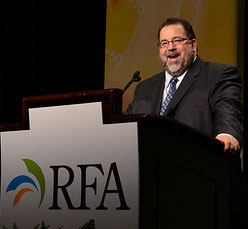
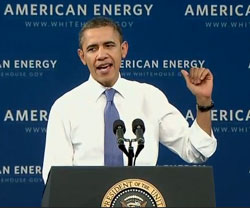 As the ethanol industry was meeting in Orlando last week, President Obama was talking energy just a few hundred miles to the south at the University of Miami.
As the ethanol industry was meeting in Orlando last week, President Obama was talking energy just a few hundred miles to the south at the University of Miami.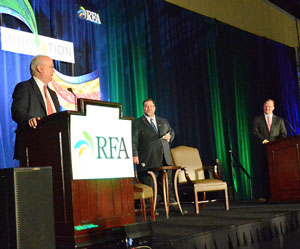 On the left, was senior advisor to President George W. Bush, Karl Rove, while on the right was the former White House Press Secretary for President Obama, Robert Gibbs. Serving as referee and moderator in the center was
On the left, was senior advisor to President George W. Bush, Karl Rove, while on the right was the former White House Press Secretary for President Obama, Robert Gibbs. Serving as referee and moderator in the center was  Coleman (left) moderated the panel which included Chris Standlee, executive vice president of
Coleman (left) moderated the panel which included Chris Standlee, executive vice president of 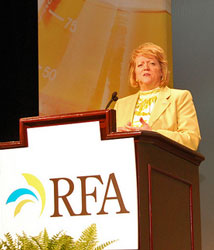 When people call Kristy Moore and ask her what she’s doing, she usually answers, “I’m just sitting around changing the nation’s fuel, and I might take a nap after lunch.”
When people call Kristy Moore and ask her what she’s doing, she usually answers, “I’m just sitting around changing the nation’s fuel, and I might take a nap after lunch.”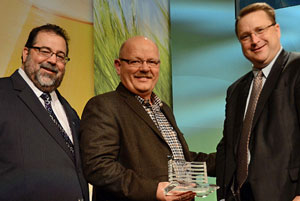 The founder and president of a world leader in ethanol plant engineering and construction is the recipient of the 2012
The founder and president of a world leader in ethanol plant engineering and construction is the recipient of the 2012